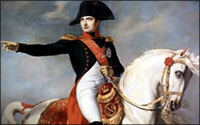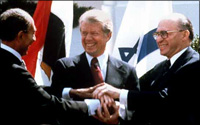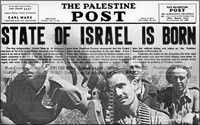 The French Revolution, like many revolutions, turned against itself. The ideas of liberty, equality and fraternity became a mockery during the period known as “The Reign of Terror,” when hundreds if not thousands of people were executed. The guillotine was busy all the time. Society abhors chaos, and the chaos that was engendered by the revolution run amok caused people to look for a strong ruler promising relief from the chaotic conditions. Enter Napoleon Bonaparte.
The French Revolution, like many revolutions, turned against itself. The ideas of liberty, equality and fraternity became a mockery during the period known as “The Reign of Terror,” when hundreds if not thousands of people were executed. The guillotine was busy all the time. Society abhors chaos, and the chaos that was engendered by the revolution run amok caused people to look for a strong ruler promising relief from the chaotic conditions. Enter Napoleon Bonaparte.
Once in power, he had great imperial designs for France. He was not satisfied for France to remain merely as a democratic republic and work on its domestic and civil rights; he wanted to make France the leading power in Europe, the leading power in the world.
Napoleon’s Attitude Toward Jews
Napoleon was a practicing Roman Catholic. In general, he cannot be thought of as a very religious Christian. Nevertheless, he represented Christian Europe as it was changing, as the ideas of the Enlightenment came and modified the behavior of Christian Europe.
Therefore, on one hand, he had inherited all of the old prejudices against the Jews. On the other hand, he was motivated by the new spirit of Europe: to grant Jews equal rights, to see to it that Jewish interests were protected and that Jews were integrated into society.
Napoleon allowed Jews to be citizens and serve in the army. However, equal rights came with a heavy cost. He took a direct hand in Jewish affairs. He was the first of a number of European leaders who would interfere in Jewish life in order to change it to their liking.
Napoleon openly stated that he wanted the Jews to assimilate, and he found allies within the Jewish people. The Reform movement agreed with him that the problem of the Jewish people could be and would be settled by a mass assimilation.
Napoleon set up a system of consistoires — consistories, governing counsels of Jews throughout the Empire — which were responsible directly to him. It was through them that Jewish life was to be governed, shaped and formed. He hoped it would help him lead the Jewish masses to become completely French within a generation. Then the Jewish problem would disappear. Certainly the Jewish religion, as practiced throughout the centuries, would disappear, he believed.
Questions for the Council of Notables
There were two events that marked Napoleon’s influence upon Jewish life. One was the convening of the Great Sanhedrin, and the second was his invasion of Eastern Europe.
The convening of the Sanhedrin took place in Paris in 1807. Preparatory to it, Napoleon convened a “Council of Notables” in which all of the Jewish lay and rabbinic leaders under his domain met in Paris to answer a series of questions submitted by Napoleon. In reality, his goal with these questions was to manipulate the Jews into following his program for them. He realized that it would look bad for the government to force the Jews to assimilate. He therefore wanted a statement from them that assimilation was their own idea and desire, so that he would be able to say that he was only fulfilling their will.
Here are the questions:
- Is it lawful for Jews to have more than one wife?
- 2. Is divorce allowed in the Jewish religion, and if it is, is it allowed even in contradiction to the codes of French law?
- 3. Does Jewish law permit a Jewess to marry a Christian man, or a Jew to marry a Christian woman, or may they marry only other Jews?
- In the eyes of Jews, are Frenchmen who are not Jewish, considered to be their brethren or strangers?
- What type of conduct does Jewish law prescribe toward non-Jewish Frenchmen?
- 6. Do the Jews who are born in France, and have been granted citizenship by the laws of France, truly acknowledge France as their country? Are they bound to defend it, to follow its laws, to follow the directions of the civil and court authorities of France?
- 7. Who elects rabbis?
- What kind of judicial power do rabbis exercise over the Jews?
- 9. If there is rabbinical jurisdiction over the Jews, is it regulated by the laws of the Jewish religion or is it merely a custom existing among Jews?
- 10. Are there professions from which Jews are excluded by Jewish law?
- 11. Does Jewish law prohibit Jews from taking usury from other Jews?
- 12. Does Jewish law prohibit Jews from taking usury from non-Jews?
The Council prepared answers, but it was not about to risk their necks. They were going to give Napoleon the answers he wanted. Additionally, many Jews truly believed in Napoleon’s program and personally wanted it for the Jews.
Based on those answers, Napoleon imposed his program for Jewish life upon the Jews. Through it, intermarriages would be recognized, Jews would spread into all professions and move to all parts of the country, and most of all he would have control of their communal structure. Within a short period of time, he expected Jewish communities to be decimated and Jewish authority—especially religious authority—undermined.
The Great Sanhedrin
Napoleon wanted to give these answers the imprimatur of religious decision. Therefore, after this Council of Notables, he called for the reconstitution of the Great Sanhedrin, the Supreme Court of the Jewish people in Biblical and Talmudic times, but which had been disbanded centuries earlier due to persecution.
Just as the Great Sanhedrin in the Land of Israel had 71 elders, now Napoleon invited 71 leaders to participate in this. They met in Paris. The 71 were a strange group, including everything from Reform clergy and laymen together with great authentic Torah scholars and rabbis. The president or chief judge of the Sanhedrin was the famous Chief Rabbi of Strasbourg, David Zintzheim (also spelled Sinzheim). He was a great Torah scholar, one of the leading rabbis in the world at that time.
Rabbi Zintzheim could not say to Napoleon that he would not sit on a council with Reform clergy, because the political realities of life then were such that one did not refuse Napoleon. Nevertheless, the fact that he was such a great rabbi, and so head-and-shoulders above the others, allowed him to sabotage it, which was his true interest. He made sure that the council came to almost no conclusions, because he knew that any conclusions, any edicts, would be in the spirit of Napoleon and not in the spirit of Jewish law. Therefore, even though publicly he fulfilled the role Napoleon wanted for him, he guaranteed that very little got done.
They held about 10 sessions before adjourning to think things over, and then Napoleon became otherwise occupied in the war with Russia and then the war with Prussia, and then his trip to Elba, which all served to diminish his interest in the Jews.
The War of 1812
There was a split among the Jews about the impending invasion of Russia by France. When Napoleon headed east, many Jews said they would support him against the Czar. The Czar was cruel and oppressive, and these Jews felt that they had no future under him. They felt that his defeat at the hands of Napoleon would bring about equal rights and the chance for economic betterment for the Jews in Eastern Europe. Napoleon’s march east had a great positive reaction among these Jews.
There were those, however, who opposed Napoleon. Not out of their love for the Czar, but simply because they saw assimilation coming. To a great extent, they were correct in their assessment. The French army brought with it Western ideals that would lead to assimilation. And even though Napoleon was defeated and sent reeling back to France, he left a lasting legacy in Russia—a lasting legacy of ideals.
The Jews recognized that the invasion of Russia by Napoleon was not just another war, but an historic event. It was the changing of the guard, the end of the old world and the ushering in of the new world. Therefore, even though Napoleon was defeated and the French army retreated physically, its spiritual and social legacy remained.
The greatest impact on Jewish life that the Napoleonic adventure accomplished in Eastern Europe would be the Haskalah (Jewish “Enlightenment”). It could not have started and achieved the success and rapid breakthrough that it did in Eastern European Jewish life without him. It would not have found any fertile field upon which its seeds could be planted.
In short, Napoleon’s influence on the Jews is seen not only in how he attempted to deal with Western European Jews, but the mere presence in his invasion army in Eastern Europe itself undermined the traditions and customs and way of life that had been almost frozen in Jewish Eastern Europe for three centuries. Now, all of a sudden, came a time of great change. And in this drastic change, the Jew naturally would find himself lonely and confused, and subject to a great many influences, many of which were not positive for him.
Napoleon was wrong, in the final analysis. He thought to solve the Jewish problem by assimilation. However, the non-Jewish world was not willing to allow it to be solved by assimilation. The Jewish world also agreed with Napoleon in that the solution to the problem lay in assimilation, but that was proven to be shortsighted, inaccurate and deadly wrong.
Of course, we are talking from 100% clear hindsight. Jews in the beginning of the 19th century in Western Europe saw a different world opening for them. Jews in Eastern Europe felt the stirrings as well, and were therefore prepared to deal with this new world on its terms, on non-Jewish terms rather than Jewish ones, to agree to things that Jews had never agreed to before, and to adopt a lifestyle which in effect was contrary to all Jewish ideals and everything for which Jewish history stood.
In conclusion, the influence of Napoleon on Jewish life cannot be minimized. It exists in the power that he exerted on Jewish life, and the shadow that he cast over all later generations as well.











